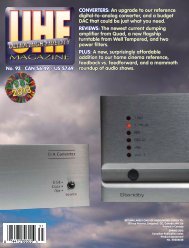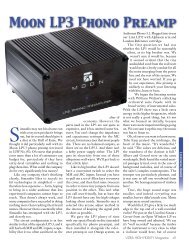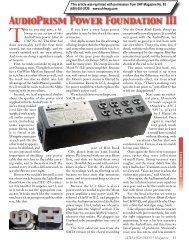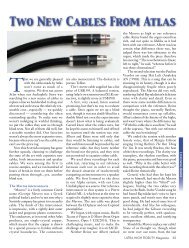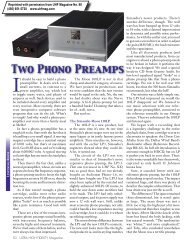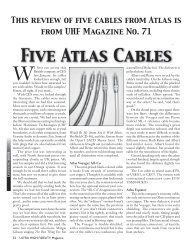A Terrific Tube Preamplifier From Korea, And A - Ultra High Fidelity ...
A Terrific Tube Preamplifier From Korea, And A - Ultra High Fidelity ...
A Terrific Tube Preamplifier From Korea, And A - Ultra High Fidelity ...
You also want an ePaper? Increase the reach of your titles
YUMPU automatically turns print PDFs into web optimized ePapers that Google loves.
Software<br />
Feedback<br />
playwright-for-hire. Thus, the phrase “a<br />
river divides our two lovers,” which is<br />
from the prologue of Romeo and Juliet,<br />
has a second meaning. We also guess<br />
that, through a series of events, the<br />
premiere of the play will be performed<br />
by Will and Viola in the respective title<br />
roles, and that their masquerade will be<br />
exposed sooner rather than later.<br />
There are a number or minor players<br />
— minor in terms of their screen<br />
time, not their talent — who add<br />
immeasurably to the delight. There’s<br />
Hugh Fennyman (Tom Wilkinson), the<br />
moneylender and avaricious investor,<br />
who is offered a minor role in the play<br />
and becomes as star-struck as Viola, succumbing<br />
to the magic of the stage. There<br />
is the formidable Judi Dench, who plays<br />
Queen Elizabeth, who knows and enjoys<br />
her privileges and powers, and carries<br />
the wisdom of being a woman in a man’s<br />
profession (both she and Paltrow got<br />
Oscars.) There is an uncredited Rupert<br />
Everett in a brief but memorable turn as<br />
Christopher Marlowe. There is Martin<br />
Clunes as Richard Burbage, the famous<br />
actor who owns the competing Curtain<br />
theatre, who delivers a key speech that<br />
might have come from Shakespeare’s<br />
own pen.<br />
Much of the dialogue does come from<br />
Shakespeare’s pen, and the powerful<br />
poetry of Romeo and Juliet poses a challenge<br />
for the screenwriters, who must<br />
match the play’s memorable language<br />
seamlessly, yet not make the phrasings<br />
too obscure for a modern audience.<br />
Marc Norman and Tom Stoppard keep<br />
the balance perfect, and they too earned<br />
an Oscar. Stoppard is familiar with the<br />
language of Shakespeare, of course. His<br />
hit play Rosencrantz and Guildenstern<br />
Are Dead told the story of two minor<br />
characters in Hamlet, and in such plays<br />
as The Real Inspector Hound he showed an<br />
affinity for inherently absurd dialogue<br />
somehow made plausible.<br />
The original DVD of the film was<br />
exceptional, but this new Blu-ray release<br />
is worth the investment. Not only is the<br />
added sharpness welcome, but the greatly<br />
extended tonal range serves the film well.<br />
We see into the shadows of such dark<br />
spaces as a tavern and backstage, and<br />
when we emerge into daylight we blink,<br />
dazzled as we are by the luminosity and<br />
74 ULTRA HIGH FIDELITY Magazine<br />
the rich colors. This is, in every way, a<br />
film to buy and treasure.<br />
The Music Man<br />
Robert Preston, Shirley Jones<br />
Warner 3000024778 (Blu-ray)<br />
Rejskind: This 1966 Meredith Wilson<br />
musical comedy remains a delight, and<br />
like most classics it didn’t need a remake.<br />
Fortunately the 2002 TV remake was<br />
quickly forgotten, and it didn’t prevent<br />
the re-release of the original on Blu-ray.<br />
The film was shot in the old non-fading<br />
Technicolor process, and the colors jump<br />
off the screen.<br />
The story is built around fast-talking<br />
con man Robert Preston, who was also in<br />
the hit Broadway production. He used to<br />
raise money for a steam-powered automobile,<br />
but — bad luck — “somebody<br />
actually invented one.” Now he arrives in<br />
River City, a small Iowa town, under the<br />
name Harold Hill, hawking his current<br />
product: a boys’ band, complete with<br />
instruments, uniforms, and non-existent<br />
music lessons. As luck would have it,<br />
he runs across Marcellus Washburne<br />
(Buddy Hackett), a one-time accomplice<br />
who has fallen in love with small-town<br />
life and a rotund local woman, and gone<br />
straight.<br />
Hill’s sales method includes stoking<br />
anxiety over some “modern” development,<br />
in this case the arrival of a pool<br />
table in a town that knows only billiards.<br />
He launches into an astonishing spiel,<br />
delivered in the rich, sonorous voice that<br />
made him famous, Trouble in River City.<br />
His prescription: a boys’ band of course<br />
(apparently the girls will do fine without<br />
it). The mayor (played by Paul Ford)<br />
is suspicious enough to be constantly<br />
demanding, unsuccessfully, to see Hill’s<br />
credentials. <strong>And</strong> besides, he owns that<br />
new pool table.<br />
In every town that “Professor Hill”<br />
descends on, he must beware of one<br />
person: the inevitable woman who gives<br />
piano lessons, since she will presumably<br />
see through him. His modus operandi is<br />
to fog up her glasses. In River City the<br />
piano teacher, Marian, is also the librarian.<br />
She is young, single and (of course)<br />
gorgeous, played by Shirley Jones, who<br />
also starred in such blockbuster musicals<br />
as Oklahoma! and Carousel. She does<br />
pretty much see through him, being the<br />
smartest woman in town, which isn’t difficult<br />
considering that author Meredith<br />
Wilson had pretty much adopted the<br />
sexist conventions that were largely<br />
unquestioned in 1962.<br />
Will Marian reveal the truth about<br />
Harold? You can’t have seen many<br />
romantic comedies if you’re not already<br />
expecting the two to fall in love. Marian<br />
will be willing to forgive a lot, and<br />
Harold will finally conclude that telling<br />
the truth is good policy.<br />
The film includes a number of local<br />
characters, including Marian’s widowed<br />
mother, her damaged nine-year old<br />
brother Winthrop (played by Ronnie<br />
Howard, much later known as director<br />
Ron Howard), the blustering mayor<br />
who is always trying to recite Lincoln’s<br />
Gettysburg Address but gets interrupted<br />
after the first couple of words,<br />
and the mayor’s wife, who accuses the<br />
librarian of distributing such “smut” as<br />
The Rubáiyát. Then there are the four<br />
members of the local school board who,<br />
when Harold persuades them to start<br />
singing, turn out to be the barbershop<br />
quartet, The Buffalo Bills.<br />
It also includes a lot of great songs<br />
that would become more famous than<br />
the show itself, including 76 Trombones,<br />
Gary, Indiana, My White Knight and Till<br />
There Was You. Who remembers that<br />
this last song became so famous that the<br />
Beatles sang it on their first LP?<br />
Yes, the film is dated. The women<br />
are mostly ignorant and superficial,<br />
and there is a clear assumption that



